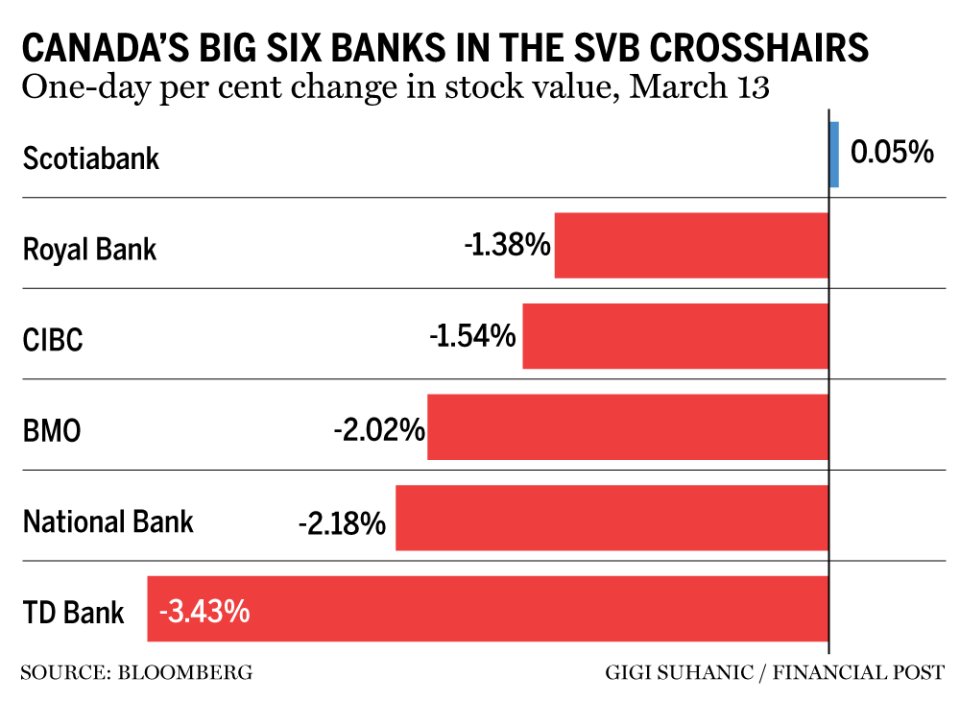How fallout from the SVB collapse could complicate life for some of Canada's big banks

The collapse of Silicon Valley Bank is unlikely to have a significant direct impact on Canada’s Big Six banks, but fallout from the U.S. tech lender’s demise could nevertheless complicate life for those with operations south of the border, analysts said on March 13.
Canadian bank stocks tumbled last week, losing nearly $20 billion in market capitalization, after Santa Clara, Calif.-based SVB suffered a run on deposits and was taken over by U.S. regulators. Bank shares were down again on Monday, with Toronto-Dominion Bank falling the furthest, off nearly three per cent in afternoon trading in Toronto. It closed down 3.43 per cent on the day.
Despite investor jitters, concerns for the Big Six were limited. Unlike SVB, which catered to a niche market funding tech start-up companies, Canada’s big banks dominate their home market and are diversified across industries and business lines.
“From a Canadian perspective, not only should the failure of SVB not have significant negative implications for our banks, but this crisis should actually be viewed as further vindication of the Canadian banking model, which is dominated by a few large and diversified players,” Bank of Nova Scotia analyst Meny Grauman said in a March 13 note.
While the risk of direct contagion to the Canadian banking system appeared minimal, National Bank of Canada analyst Gabriel Dechaine flagged some potential sore spots Canadian banks, especially those with major recent acquisitions in the U.S., could face in the wake of SVB’s collapse.
BMO, for example, has just established a foothold in California, where SVB did most of its business, through its US$16.3 billion Bank of the West acquisition.
“Though (Bank of the West) has different lending exposures within the state (i.e., not uber-concentrated in tech), if there is a ripple effect of SVB’s failure on the broader economy in California, BMO’s growth outlook could dampen,” Dechaine said in a March 13 note.
He added that further declines in the loan and deposit balances at Bank of the West, which were already below BMO’s initial expectations at the time the deal closed earlier this month, could prompt the bank to revise its forecasts again.

Dechaine said the SVB fallout also makes TD’s US$13.4 billion acquisition of First Horizon Corp. more interesting. TD has indicated that it does not expect to achieve regulatory approval by the proposed May 27 closing date and is trying to negotiate another extension. There has been speculation it might try to reduce its offer.
“Setting aside the issue of obtaining regulatory approvals, recent events have prompted even more questions about TD’s ability and willingness to negotiate a lower acquisition price,” Dechaine said, noting U.S. regional bank stocks plunged 12 per cent last week.
RBC, meanwhile, has had a growing stake in the California market since its acquisition of City National Bank in 2015. Dechaine’s concerns with RBC’s California footprint were somewhat assuaged by the fact that the state represents only seven to eight per cent of RBC’s total lending.
RBC was reportedly one of the potential suitors looking under the hood of SVB after regulators took control, according to Reuters. Sources told reporters that RBC had been exploring options to pursue SVB but was ultimately not comfortable with the risks involved. RBC declined to comment on the Reuters report and the SVB collapse.
Exposure to the U.S. regional banking market in general was another risk flagged by Dechaine. San Francisco-based First Republic Bank saw its shares fell by over 75 per cent in early Monday morning market trading amid fears that some smaller banks could be vulnerable if depositors became nervous and started to withdraw funds.
Increased regulatory risk also appeared to be on the table after U.S. President Joe Biden on March 13 said he wanted to prevent a repeat of the collapse.
“I’m going to ask Congress and the banking regulators to strengthen the rules for banks to make it less likely this kind of bank failure will happen again, and to protect American jobs as a small business,” he said.
OSFI seizes control of Silicon Valley Bank's Canadian assets
Canada's banks beat the street, but can they outrun the downturn?
Despite the uncertainties, authorities on both sides of the border offered assurances that the financial and banking systems were safe.
The Office of the Superintendent of Financial Institutions, Canada’s top banking regulator, seized SVB’s Canadian operations on March 12 and made it clear that SVB did not take deposits in Canada and that its collapse was due to its specific predicament.
Deputy Prime Minister Chrystia Freeland said she spoke with financial sector leaders on the evening of March 12.
“We are in close contact with OSFI, which took action earlier this evening,” Freeland said in a March 12 statement on Twitter. “Canada’s well-regulated banking system is sound and resilient.”
Scotiabank’s Grauman suggested the episode might prompt the U.S. banking sector to take pointers from its Canadian counterpart, which is more concentrated. He said even without formally making such a move, U.S. deposit balances might shift from smaller financial players toward bigger banks with larger capital pools to reduce risk.
• Email: shughes@postmedia.com | Twitter: StephHughes95

 Yahoo Finance
Yahoo Finance 